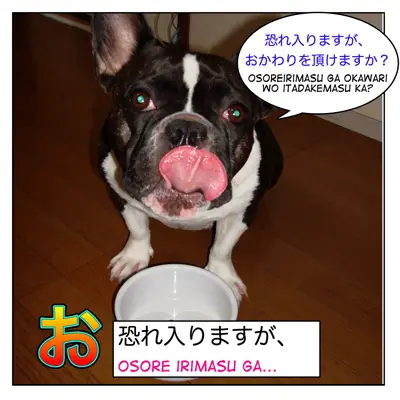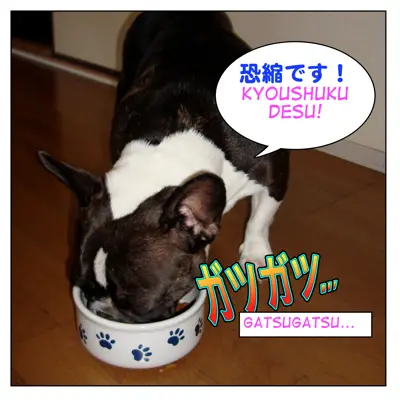🐶「恐れ入りますが、おかわりを頂けますか?」
= Osoreirimasu ga, okawari wo itadakemasuka?
= I am awfully sorry to bother you but could I have a second serving, please?
Today we will learn very formal and polite Japanese expressions.
恐れ入りますが、おかわりを頂けますか?」
= Osoreirimasu ga, okawari wo itadakemasuka?
= I am awfully sorry to bother you but could I have a second serving, please?”
おかわり ( = okawari) : seconds, a second helping, a refill
頂けますか? ( = Itadake masu ka?) Could you give me~/ Could I have ~
You say 「恐れ入りますが…」 ( = Osore irimasu ga) before you ask someone a favor or a question.
Ex. 1)「恐れ入りますが、ゴミはこちらにお捨て下さい。」
= Osore irimasu ga gomi wa kochirani osute kudasai .
= I am truly sorry to bother you but please throw away the trash here.
ゴミ = gomi = trash
こちら = kochira = here/ this way ( more polite than ここ = koko )
捨てる = suteru = throw away
Ex. 2)「恐れ入りますが、駅までの行き方をお教え頂けますでしょうか?」
= Osore irimasu ga, eki made no iki kata wo ooshie itadakemasu de shouka?
= Excuse me / I am awfully sorry to bother you, but could you tell me how to get to the station, please?
駅 = eki = station
までの = madeno = to
行き方 ikikata = direction
教える = oshieru = to show, to teach, to tell, to instruct
お教え〜 =”ooshie” is more polite than 「教えて〜」= “oshiete”
(〜して)頂けますでしょうか? = itadakemasudeshouka = Could you do something for me?
Ex. 3)「恐れ入りますが、そこの塩を取って頂けますか?」
= Osore irimasu ga, sokono shio wo totte itadakemasuka ?
= Excuse me / I am sorry to bother you, but could you pass me the salt (which is near you) please?
塩 = shio = salt
そこの sokono = (right) there
取る = toru = to take, to pass
(~して)頂けますか?= itadakemasuka = Could you do something for me?
→Note :The former example (~して)頂けますでしょうか? = itadakemasu deshouka sounds a bit more softer.)
Ex. 4) 恐れ入りますが、お名前を頂けますか?
= Osore irimasu ga onamae wo itadakemasuka?
= I am sorry, but may I have your name, please?
名前 = なまえ = namae = name
お名前 =おなまえ ( = onamae) is more polite
You say「恐れ入ります。」( = osore irimasu) after someone does something for you, too.
That means “Thank you!” or “Sorry for all the trouble.”
•「恐れ入りました。」 ( = Osore irimashita. = past tense) could be translated as “I’ll be damned.”
You say that to a person who defeated you in a match or a game with respect implying “You are great/strong/much stronger than I.” or “Now I see your greatness/strength.”
Similar expression: 「参りました!」( = Mairimashita. ) ” I lost! ” or “You won!” )
:w: You also say 恐縮する ( = kyoushuku suru) which means “to feel very grateful” and it is a very humble expression.
:n: Note: Kanji
The kanji,
「恐」:
On-reading is “きょう ” ( = kyou).
Kun-reading is 「恐れる」= おそれる ( = osoreru) It means “to fear”
「縮 」
On-reading =しゅく = shuku.
Kun-reading is 「縮む」= ちぢむ ( = chijimu) . It means “to shrink”
So literally you tremble and feel like shrinking for the gratitude or feeling bad for making someone do something for you.
Ex. 5) 「恐縮ですが、コピーを頂けますか?」
= Kyoushuku desuga, kopii wo itadakemasu ka?
= Sorry to trouble you, but may I have a copy, please?
🐶「恐縮です!」
= Kyoushuku desu.
= Thank you for all your trouble!
(ガツガツ)
= Gatsu gatsu
The sound you make when you gorge yourself.
 マギー先生より = Maggie Sensei yori = From Maggie-sensei,
マギー先生より = Maggie Sensei yori = From Maggie-sensei,
ほらね、私はいつでも誰にでも礼儀正しくしているから、見習ってね!
「あっ!また、おかわり、頂戴!」
= Horane, watashi wa itsu demo dareni demo reigi tadashiku shiteiru kara minaratte ne! “Ah, Mata Okawari choudai!”
= See, I am trying to be polite to everybody all the time. So please learn from my attitude!
“Now gimme a third helping!”



11 Comments
I am super enjoying your lesson maggie sensei! I have been to many japanese learning sites, so far you’re on my TOP 3 best japanese learning sites!!
btw How do we say “sorry for troubling you but….” but in casual way(talking with friends)?
@Lucky
Hello Lucky,
I am VERY happy to hear you are enjoying my lessons.
“sorry for troubling you but….” in casual way, huh?
There are a couple of ways to say that
悪いけど= waruikedo
お手数かけるけど= Otesuu kakeru kedo
面倒かけるけど= Mendou kakeru kedo
Ex.悪いけど買い物に行ってきてくれる?
Ex.お手数かけるけどこの手紙出しておいてくれる?
Ex.面倒かけるけど明日、駅まで来てくれる?
Hi Maggie Sensei, when we see the kanji ‘恐’ how do we know we should read it as ‘oso’ from ‘恐れる’ in kun reading or we should read it as ‘kyuo’ from ‘恐縮ですが’ in on reading?
@Komet Tjin
There are lots of exceptions but the basic rules are :
On reading is usually used when it is used with other kanji as a compoun word. And kun reading is used on its own with hiragana.
kun reading :
*恐れる = osoreru = to be scared
*縮む = chijimu = shrink
a compound word : 恐+縮
You use on-reading
恐縮 kyoushuku
hi Ms. Maggie,
i hope you can make more keigo and formal japanese lessons :)
i want learn and be able to speak more keigo and formal japanese..
Godbless and More power to your blogsite :D
ありがとうございます
よろしくお願いします
maple-san,
かしこまりました!
I will try to make both formal and casual Japanese for everyone!
面白い!
あんがとう、マギー先生。
Henryfreemanさん
恐れ入ります!こちらこそ有り難うございます!また来てね!
あ。。そうですね。
すみませんが、ちょっと間違いを見つけました。例5のローマ字はkyoushukuでしょう?
授業をありがとうございました。恐縮です!
amandaparks様
恐れ入ります。早速、間違いを直しました。前足でタイプするのは大変です。